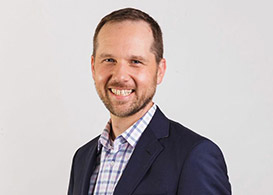By Milt Capps
Published Wednesday, December 13, 2017 12:00 pm
|
JASON DINGER, the Nashville-based chief incubation officer for Ascension Health Alliance, says he welcomes approaches from entrepreneurs and others who have solid ideas for solutions to "jobs that need to be done" in the healthcare sector.
Dinger recently told an audience gathered here in town by The Disruption Lab that he and his incubation team are currently working on "15 to 20" projects, roughly 50% of which involve startups focused on healthcare, healthIT or related targets.
He said perhaps 30% of incubation projects he oversees were born within his own shop, with the remaining 20% of all projects emerging from elsewhere within the Ascension ecosystem, which extends to 22 states and the District of Columbia and which generated $21.9BN revenue in 2016.
Dinger said not-for-profit Ascension works with innovators in a variety of ways:
Ascension might, for instance, become a client of the innovating team, and could, over time, become a "Whale" customer for the product or service.
If Ascension commits to working with a team to incubate an idea, it may provide provide substantial resources for a defined period to advance development on a "demo or die" basis, and could subsequently provide market access and-or funding for commercialization.
Ascension's incubation framework includes opportunities to discuss growth funding and/or Ascension acquisition of the resulting enterprise.
Dinger, 43, was quick to emphasize that the incubation program he leads is separated from Ascension's VC holding, Ascension Ventures, as well as from the company's ongoing mergers and acquisitions function.
Notably, The Wall Street Journal broke news Dec. 10 that St. Louis-based Ascension is in merger talks with Renton, Wash.-based Providence St. Joseph Health. If the successful, the combined groups would exceed HCA's recent hospital count and annual revenues.
Dinger's duties are described as "spanning designing, guiding and operationalizing new [products and services] and transformative innovations across Ascension, with emphasis on those that require incubational and entrepreneurial direction."
In his role, he tackles requirements that manifest nationally and internationally, and coordinates with leaders throughout the Ascension enterprise for testing, piloting and launching new solutions.
In his Disruption Lab presentation, Dinger acknowledged that in incubating and commercializing vital ideas, emphasis on structure and process are of course essential.
However, he went on to emphasize that consideration of knowledge and techniques drawn from the application of decision theory and principles of economic behavior, particularly behavior under conditions of uncertainty, are also influential in determining the ultimate value and utility of products and services produce through incubation, innovation and entrepreneurial efforts.
During his recent presentation, Dinger also emphasized that in assembling Ascension's incubation toolkit, he had drawn on lessons learned within major companies within "innovation management" and related initiatives.
One of his slides listed such major innovators as AARP, Willis Towers Watson, Pfizer Consumer Healthcare, Coca-Cola, Anthem, Medtronic, Procter & Gamble, Innosight, LEGO and Deloitte, among others.
Dinger's wide-ranging presentation served partly to de-mystify "the Innovation space," which he noted tends to attract "self-righteous" reformers and "people who like big ideas [and] like taking on the establishment," as well, fortunately, as people who are more dedicated to creating and delivering solutions for real-world problems or pain-points.
Though it's impractical to recount Dinger's entire robust presentation here, entrepreneurs and investors might especially appreciate the following bits (all errors of interpretation are ours):
Approaches to innovation efforts should empower participants to "walk away" from sunk costs, despite that workers often come to regard the spend-to-date as an "endowment" that must be protected, far past the point at which the plug should be pulled.
In that mindset, said Dinger, teams may repeatedly opt to keep spending time, talent and other resources, changing their "success criteria" along the way to imbue their decisions with legitimacy. They often ignore better alternative solutions they might encounter along the way, even though a pivot might cost less.
"It gets so perverse that the higher the [expenditure], the more irrational" such a group becomes, said Dinger.
In such settings, teams can stick too long to efforts that no longer meet any defined and validated set of success criteria, discounting the venture's burn rate, as long as (e.g.) the development effort, per se, is seen as improving.
Worse, teams within enterprises can develop an unfortunate knack for selling and promoting their work.
To guard against irrationality, he said, companies and their teams should adopt a "span-of-time" mindset, and rewards should be tied to outcomes, rather than to activities.
Particularly in larger organizations, another risk is that of getting irrevocably involved in "building" a solution "too early," and letting the hypothesis that lies at the heart of the solution fade into the background, as attention shifts to developing a minimum viable product (MVP) or management becomes enthralled by the potential dollar value of commercialization.
Dinger suggested that healthcare-sector innovators who are fearful of the prospect of a shrinking traditional in-patient market, should at times worry less about being the next to "disrupt the space," and give more attention to how incumbent providers transition effectively into the next era of healthcare delivery, medical devices and the rest, a framework that may lead to, among other things, increased emphasis on partnering with other industries.
Dinger, a Tacoma native, previously served as CEO of the Ascension unit then known as MissionPoint Health Partners; as chief strategy officer for Ascension's Saint Thomas Health; and, among other posts, he served as CEO of the Dispensary of Hope.
He earned both his bachelor's in Public Policy (1997) and his PhD in Leadership, Policy and Organizations at Vanderbilt University. At VU, Dinger was an Ingram Scholar. His LinkedIn profile is here. VNC
.
